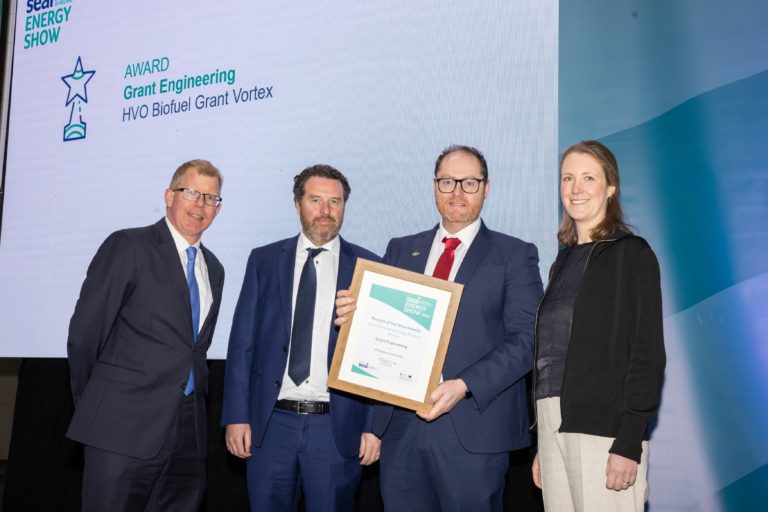
Renowned for highly efficient, innovative heating technologies and commitment to reducing carbon emissions, this award is the leading home heating solutions company’s first major recognition for its HVO biofuel compatible Grant Vortex boiler.
The product was developed following an investment of over €250,000 in R&D which aimed to help existing rural and hard to heat homes reduce carbon emissions and helping to prevent homeowners from incurring the high cost and subsequent disruption to daily life of deep retrofitting.
Grant was also recognised for its innovation in The Irish Times Innovation Awards 2021, where the same product was a finalist in the sustainability category.
Leading the way on sustainable home- heating
Founder, Stephen Grant said: “We are delighted that our HVO biofuel compatible Grant Vortex boiler received Best Renewable Energy Product of the Show at the SEAI Energy Awards. Our breakthrough in the research and development of HVO-ready condensing boilers has led the way for us to transform largely into a renewable heating company and we continue to lead the industry in designing and manufacturing heating technologies that offer a low carbon and sustainable home heating solution for homeowners throughout Ireland going forward into the future.”
While HVO is a relatively new fuel to Ireland, in Europe and the UK it is used for marine and public transport and to power generators and over 100 oil-heated properties across the UK have now converted to the fossil- free kerosene alternative in demonstrations led by trade associations UKIFDA and OFTEC.
HVO currently available in the UK and Ireland is manufactured from 100% renewable and sustainable waste-derived raw materials and certified via the International Sustainability and Carbon Certification (ISCC) scheme.
“HVO WILL ENABLE HARD TO HEAT IRISH HOMES TO TRANSITION”
Meeting Ireland’s carbon emissions target
Stephen continues: “Over 1 million liquid fueled homes on the island of Ireland could be decarbonised by installing an HVO biofuel compatible Grant Vortex boiler, especially those who are off the grid and that have poor thermal efficiency.
The cost of updating an existing boiler would be approximately €500 when matching and changing to a new biofuel burner, however this could be substantially less if the boiler is already biofuel compatible.”
Niall Fay, director of Grant said: “Using 100% HVO for heating will help meet Irelands carbon emissions target and result in circa 87% immediate carbon reduction and using this or a percentage blend of HVO with kerosene, will enable rural and hard to heat Irish homes to transition to a renewable green alternative from 100% kerosene at an affordable cost and minimum disruption to their home lives.
In terms of renewable heating, using 100% HVO could provide a more sustainable way to heat existing homes than a heat pump.”
Key role for biofuels
Grant is a member of OFTEC and David Blevings, Ireland manager, commented: “This is a very positive step and reinforces our belief that biofuels have a key role to play in in reducing emissions in the home heat sector. We have continually advised Government that the introduction of a biofuel as a replacement for kerosene is a viable option and should be part of Ireland’s future energy mix.
Replacing kerosene with HVO is a seamless transition for existing liquid fuel users and a simple option for Government to reduce carbon emissions in the off-grid sector.
If all the c.700 thousand oil fired homes moved to HVO tomorrow, the annual carbon emissions from the liquid fuel sector would drop from c.3.7 million tonnes to 488 thousand tonnes pa; those substantial savings are available today, not in ten years’ time”.
